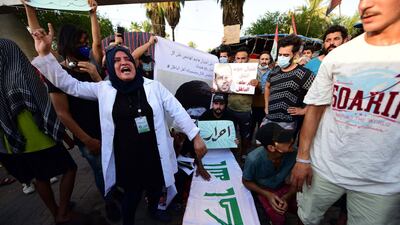The overturning of the death sentence for the killing of prominent Iraqi academic Hisham Al Hashimi comes as “no surprise” and illustrates how impunity is entrenched into the state, experts and activists told The National on Thursday.
Iraq’s criminal court has sent the case of Ahmed Hamdawi Oueid, who was sentenced to death in May, back to investigators. Oueid confessed to the crime when he was arrested and the confession was aired on state television in 2021.
Mr Al Hashimi was gunned down outside his family home in Baghdad by two attackers on a motorcycle in July 2020, leading to condemnation and outrage across Iraq.
“All the decisions rendered by the central court are annulled … and the case is returned to the competent court responsible for investigating,” the court of cassation said.
The ruling was issued at the end of July and published on the court's website this week. The court said the committee that is responsible for investigating the killing has “no legal power” to carry out the sentencing.
Committee 29, which is now disbanded, had been set up by former prime minister Mustafa Al Kadhimi to fight corruption, among other issues.
Iraq's judicial system and process has been questionable, Renad Mansour, director of the Iraq Initiative at London's Chatham House think tank, told The National.
“There hasn’t been enough done in terms of accountability and ensuring that there is a clear and legitimate process,” Mr Mansour, who was a close friend to Mr Al Hashimi, said.
The court’s decision comes as “no surprise”, he said, adding that Iraq's real challenge in the judiciary is its politicisation.
“The killing of Hisham is a political issue. Sadly for those who knew him and were outraged by what happened it goes to show that impunity continues in multiple ways to be part of the Iraqi state,” he said.
Mr Mansour said he remains uncertain whether justice can prevail for his friend.
Security and political expert Mr Al Hashimi was one of Iraq's most important researchers on extremist movements, providing crucial insights on ISIS and other militant groups to politicians and diplomats. He was also a supporter of the country's anti-corruption protest movement that erupted in 2019.
Hassan Wahab, an activist from the Amal Association human rights group, told The National that fair trials are an important requirement of the system, however Iraq suffers from severely weakened rule of law.
“This development shows the culprit could be acquitted. We have been pushing for a thorough investigation since Hisham was killed three years ago,” Mr Wahab said.
“We were hoping to conduct an in-depth investigation with the accused to reveal the causes and motives of the crime and the parties involved, but it doesn't seem to be the case,” he said.
Alongside hundreds of Iraqi protesters gunned down by militias in 2019 and 2020 were scores of Iraqi activists, many of them assassinated in the street by hit squads on motorbikes.
Iran-backed militias, who issued public threats to use lethal force against the protesters, are widely believed to be the culprits.
Mr Al Hashimi left behind his wife, three sons and a daughter.


